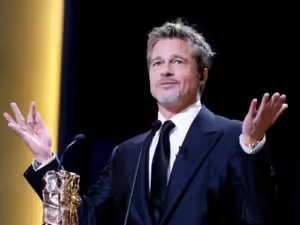
Brianna “Chickenfry” LaPaglia is making headlines as she navigates life after her breakup with country singer Zach Bryan. Recently, she posted a TikTok video that has sparked conversation among her followers, revealing a glimpse into her new life and the challenges she faced during her relationship with Bryan.
The Breakup: A Public Split
Brianna and Zach dated for just over a year, with their relationship becoming a subject of public interest. The couple had agreed to keep their split private, but Bryan’s public announcement left Brianna feeling blindsided.
In her TikTok video, Brianna seems to be embracing her independence, captioning it, “Sometimes all you need is a NYC sunrise and some good pals.” This reflects her desire to move forward and find joy in her life after a difficult breakup.
Social Media Presence: A New Beginning
Brianna has turned to social media to share her journey with her followers. In a recent TikTok, she appears cozy with an unidentified man, leading some commenters to remark, “that was fast,” in reference to her moving on from Zach.
In response, Brianna candidly stated, “Well, I was cheated on my whole relationship so yeah.” This comment highlights the emotional turmoil she experienced during her time with Bryan, providing insight into her current mindset.
Embracing Her Roots
Brianna has expressed her excitement about returning to her roots in New York. She mentioned looking at new apartments and spending time with friends. Her followers have praised her for showcasing her daily life in a vlog-style format, which resonates with her audience and allows them to connect with her on a personal level.
Public Reactions: The Mixed Bag of Comments
Brianna’s decision to share her new life has garnered mixed reactions from her followers. While many support her move to embrace happiness post-breakup, others question the speed at which she seems to be moving on.
The comment about her moving on “fast” reflects a common societal expectation that individuals should take time to grieve after a breakup. However, Brianna’s response reveals her strength and willingness to prioritize her well-being.
Allegations of Emotional Abuse: A Deeper Look
Amidst the breakup, Brianna has opened up about the emotional challenges she faced during her relationship with Zach. In a recent episode of the “BFFs” podcast, she alleged that she was in an emotionally abusive relationship. This revelation adds a layer of complexity to her public persona and highlights the importance of discussing mental health in relationships.
Brianna also claimed that Zach’s team offered her $12 million to sign a non-disclosure agreement (NDA) to prevent her from speaking about their relationship. This shocking allegation has raised eyebrows and led to further speculation about the dynamics of their relationship.
The Implications of Moving On Quickly After a Breakup
Moving on quickly after a breakup is a common theme in modern relationships.
As individuals navigate their feelings, some find themselves eager to enter new romantic connections without taking the necessary time to heal.
But what does it mean to move on quickly, and what are the implications of this behavior?
In this article, we will explore the emotional, psychological, and social aspects of moving on quickly after a breakup, as well as its impact on future relationships.
Understanding Moving On Quickly
Moving on quickly refers to the process of starting new romantic relationships shortly after a previous one has ended.
This phenomenon is often driven by a desire to escape feelings of loneliness, sadness, or rejection.
For some, it can seem like a way to validate oneself after a painful breakup.
However, it’s essential to examine how this rush can influence a person’s emotional health and future relationships.
Emotional Implications of Moving On
When someone transitions to a new relationship without fully processing the end of their previous one, they may encounter several emotional challenges.
Unresolved feelings from the past can linger, making it difficult to engage fully with a new partner.
These feelings can manifest as anxiety, jealousy, and insecurity in the new relationship.
Dealing with Unresolved Feelings
Unacknowledged emotions from the previous relationship can lead to confusion.
For example, an individual may still have feelings for their ex while trying to build something new.
This internal conflict can create stress and tension, ultimately affecting the new relationship dynamics.
Furthermore, this can lead to unhealthy comparisons between the ex and the new partner, causing unnecessary strain.
Psychological Effects of Rushing into New Relationships
The urge to quickly replace a former partner can be a coping mechanism rooted in fear or insecurity.
Many individuals fear being alone and rush into new relationships to avoid loneliness.
However, such behavior might lead to what is commonly known as “rebound relationships”.
Understanding Rebound Relationships
Rebound relationships occur when individuals start dating someone new immediately after a breakup.
While these relationships can offer temporary emotional relief, they often lack the depth and connection that come from a healthy partnership.
Rebounds can serve as a distraction, preventing individuals from processing their feelings.
Over time, this can lead to new heartbreak if the rebound fails, adding to emotional turmoil.
Social Perceptions and Their Impact
Society often has a lot to say about how quickly someone should move on after a breakup.
Many people might judge someone for moving on too fast, labeling them as immature or fickle.
This pressure can create feelings of shame or guilt for those who are trying to navigate their own healing process.
The Role of Social Media
In today’s digital age, social media plays a significant role in how relationships are perceived.
Individuals may feel compelled to showcase their new romances online, seeking validation from followers.
This pressure can exacerbate the desire to continue moving forward, even when healing is needed.
Relationship Dynamics: Effects on the Future
The implications of moving on quickly can extend beyond the immediate emotional and psychological effects.
Individuals who rush into new relationships may carry unresolved issues into their future partnerships.
Without addressing past trauma or heartbreak, they might find themselves facing the same challenges repeatedly.
Importance of Healing Before New Relationships
Taking time to heal after a breakup is not just beneficial; it is crucial for long-term happiness in future relationships.
Proper healing allows individuals to reflect on their past experiences and learn valuable lessons about themselves and what they want in a partner.
This intentional time away from dating can lead to healthier, more meaningful connections in the future.
How Social Media Platforms Impact the Perception of Relationships
In today’s digital age, social media has become an integral part of our daily lives.
These platforms influence how we connect with others, share our experiences, and perceive our relationships.
Whether we are scrolling through Instagram or liking posts on Facebook, social media plays a significant role in shaping our understanding of love, friendship, and family dynamics.
But how exactly do these platforms impact our perception of relationships?
Let’s explore the various ways social media shapes our views on connections with others.
Social Media as a Relationship Reflector
Social media acts as a mirror reflecting our relationship statuses and milestones.
Friends and followers keep up with our lives by viewing our posts.
When people get engaged, married, or celebrate anniversaries, they often share these significant moments on social media.
This practice creates a sense of community and acknowledgment, but it also influences how individuals view their relationships.
The Importance of Public Recognition
The need for public acknowledgment can drive people to showcase their romantic or platonic relationships on social media.
This is due to our desire for validation and support from others.
A relationship that is not shared online may feel less legitimate or meaningful in the eyes of some.
As a result, individuals may find themselves more focused on external appearances rather than personal happiness.
The Highlight Reel Effect
One of the most significant impacts of social media is the “highlight reel” effect.
People often post only the best and most exciting moments of their lives.
This creates an unrealistic portrayal of relationships.
When scrolling through a feed filled with joyful couple shots and perfect family moments, individuals can start to feel inadequate about their own experiences.
The Pressure to Present a Perfect Image
The pressure to present “picture-perfect” relationships online can lead to heightened anxiety and insecurity.
Many individuals may feel compelled to create an idealized version of their own relationships to meet social expectations.
This can overshadow the more challenging, quieter, or imperfect aspects that are part of any real relationship.
When we start believing that every relationship should be filled with perfection, we can grow dissatisfied with our realities.
Comparative Mindset: The Danger of Envy
Social media often fosters a mindset of comparison.
Users frequently compare their lives and relationships to what they see on their feeds.
This can lead to feelings of jealousy or inadequacy.
Seeing friends or influencers living seemingly perfect lives can make others feel as though they are falling short.
Emotional Consequences of Comparison
Comparing ourselves to others online can create unrealistic expectations.
For example, if a person sees couples going on elaborate vacations or receiving extravagant gifts, they may feel their own relationship is lacking.
This could lead to dissatisfaction or conflict, affecting the relationship’s overall health.
Recognizing that social media represents only one side of the story is crucial.
The curated nature of online content often hides the struggles or challenges that people face behind the scenes.
Influence on Relationship Dynamics
Social media significantly influences how couples communicate and resolve conflicts.
In the past, disagreements would often be addressed face-to-face.
Now, many people turn to text messages or social media to express their feelings.
This shift can change the dynamics of how relationships function.
The Role of Online Communication
Couples often find themselves having discussions over social media platforms rather than in person.
While this can allow for greater reflection before responding, it also opens the door to misunderstandings.
Tone can be misinterpreted when discussing sensitive topics in text form.
Furthermore, the ease of sharing information online can lead to oversharing, where personal issues become public knowledge, complicating relationships further.
Recognizing the Signs of Emotional Abuse in Relationships
Emotional abuse is a serious issue that often goes unnoticed.
Unlike physical abuse, it can be challenging to identify because it doesn’t leave visible scars.
However, the impact of emotional abuse can be just as damaging, affecting a person’s mental health, self-esteem, and overall well-being.
In this post, we’ll discuss the signs of emotional abuse in relationships and how to recognize them.
Understanding Emotional Abuse
Emotional abuse is a pattern of behavior used to control, manipulate, or belittle a partner.
It can occur in romantic relationships, friendships, or even within families.
The goal of emotional abuse is often to undermine the victim’s sense of self-worth and independence.
The Impact of Emotional Abuse
The consequences of emotional abuse can be profound.
Victims may experience anxiety, depression, and a diminished sense of self.
Understanding emotional abuse is critical, as many people might not recognize it as a form of abuse.
This leads to silence and isolation, making it essential to identify the signs early.
Common Signs of Emotional Abuse
Recognizing emotional abuse involves looking for specific behaviors that indicate manipulation and control.
Here are some of the most common signs:
1. Constant Criticism
Consistent negative remarks can be a major red flag.
If your partner frequently criticizes your appearance, choices, or abilities, it can significantly undermine your confidence.
This continual negativity can make you feel worthless over time.
2. Gaslighting
Gaslighting is a manipulative tactic where the abuser makes the victim question their reality or perceptions.
For example, they might deny things they said or did, leading you to believe you are imagining things.
This can create significant confusion and self-doubt.
3. Isolation
An emotionally abusive partner may try to isolate you from friends and family.
They might discourage you from spending time with loved ones or even create conflicts that make it difficult for you to maintain those relationships.
This isolation can intensify feelings of dependency on the abuser.
4. Mood Swings and Unpredictability
Emotional abusers often exhibit mood swings, which can keep their partners on edge.
You might find yourself walking on eggshells, trying to avoid triggering their anger or frustration.
This unpredictability can create a sense of instability in the relationship.
5. Control Over Daily Life
If your partner tries to control aspects of your daily life— like what you wear, who you see, or even how you spend your money— this could signify emotional abuse.
Such controlling behavior can infringe upon your personal freedom and autonomy.
6. Withholding Affection or Communication
Withholding affection and communication is another tactic used by emotional abusers.
They may intentionally ignore you or refuse to show love in order to punish or manipulate you.
This denial of basic emotional needs can be incredibly damaging.
7. Threats and Intimidation
While not always physical, threats and intimidation are still forms of emotional abuse.
These threats can be explicit or implied but can create an environment of fear, leaving you feeling trapped.
Effects of Emotional Abuse
The effects of emotional abuse can last long after the relationship ends.
Here are some potential consequences to be aware of:
Short-term Effects
In the short term, victims may experience anxiety, stress, and low self-esteem.
They might also feel confused, afraid, or isolated.
Long-term Effects
Long-term emotional abuse can lead to chronic depression, post-traumatic stress disorder (PTSD), and difficulties in future relationships.
A person may have trouble trusting others or may develop unhealthy attachment styles.
Impact on Mental Health
Overall, the mental health impacts can be severe and lasting.
Victims of emotional abuse might struggle with feelings of worthlessness and inadequacy for years after leaving the relationship.
Recognizing Patterns of Emotional Abuse
It’s vital to recognize patterns that may indicate emotional abuse in your relationship.
1. Repetitive Behaviors
Pay attention to whether certain negative behaviors are repeated over time.
If someone continuously belittles you or disregards your feelings, it’s crucial to take note.
2. The Cycle of Abuse
Often, emotional abuse follows a cycle where periods of negativity are followed by apologies or temporary kindness.
This can confuse victims, making them doubt the severity of the abuse.
3. Evaluating Relationship Health
Assess how your relationship makes you feel.
If you often feel afraid, anxious, or unworthy, it’s essential to consider whether these feelings are tied to emotional abuse.



















